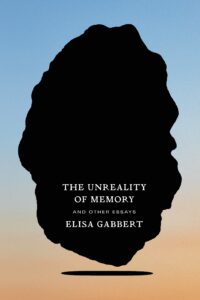 Nothing escapes Elisa Gabbert. Her critical eye is on display throughout the essays in The Unreality of Memory—a book that is as difficult to read in our moment as it is necessary. The Unreality of Memory is a book about disasters: what they look like, how we respond to them, and what we even think the word means. Deeply researched but never dull, each essay practices the fine art of obsession and draws the reader in regardless or because of how horrifying the subject matter proves to be, from nuclear meltdowns to climate change, plague to mass hysteria—each essay is a reckoning.
Nothing escapes Elisa Gabbert. Her critical eye is on display throughout the essays in The Unreality of Memory—a book that is as difficult to read in our moment as it is necessary. The Unreality of Memory is a book about disasters: what they look like, how we respond to them, and what we even think the word means. Deeply researched but never dull, each essay practices the fine art of obsession and draws the reader in regardless or because of how horrifying the subject matter proves to be, from nuclear meltdowns to climate change, plague to mass hysteria—each essay is a reckoning.
Kyle Williams: I’m going to start with what is maybe my most unfair question: It’s difficult to read the disaster essays in your book without thinking about the pandemic. In the opening essay, you write “It’s the spectacle, I think, that makes a disaster a disaster.” Covid, by contrast, is not so spectacular; so much of its devastation is communicated by numbers rather than fire or explosive imagery. Thinking about that, is Covid a disaster? Some other brand of tragedy?
Elisa Gabbert: Covid is certainly a massive disaster, but you’re right that the imagery isn’t what we’re used to—there’s no rubble or explosions in the sky. We’re not seeing much footage from hospitals or morgues. Apart from the photos of people wearing masks, which somehow always look like stock photography, the spectacle seems to be almost entirely graphical, conveyed with these charts where the y axis has to keep being extended so the curve will still fit on the chart. I do wonder if this makes it more deniable; it’s easier for people to imagine it’s a hoax if they can’t see the dead. But even for those of us who do believe it, the scale of the tragedy is rather too abstract to grasp.
I’d really love to hear about your research process. The depth and breadth of these essays are astounding, and I love the mention in “The Great Mortality” about a stack of books you’d been going through. How do you direct your research? And, given that some of these essays connect things that appear at first unconnected, where do you draw the line to say “no more research”?
Ugh, I love the research part of writing an essay—and I miss it so much. I haven’t really thrown myself into a project like that for a while, probably not since I wrote about hair metal (for which the “research” mostly involved watching old videos on YouTube). Early in 2020 I was working on some book review assignments, and then when Covid hit I lost access to the library. The library is a very important part of my process. When I get interested in a subject and decide I want to write about it, I like to surround myself with material, with big stacks of library books and books from our own shelves. Then I’ll start a document where I store all my notes, and it becomes this big collection of facts and quotations from my reading and my own commentary and observations. The notes are inevitably longer than the essay; the map is larger than the territory. I also do a lot of googling and end up going down these rabbit holes on Wikipedia—I love the little lists of related pages at the bottom of Wikipedia articles, like how the “voodoo death” page links to “death by laughter” and a “list of unusual deaths” (“Crown Prince Philip of France died while riding through Paris, when his horse tripped over a black pig running out of a dung heap”). This part of the process can go on for weeks or months, and when I’m in this stage almost everything I see or read seems to somehow relate to the subject. Eventually I’ll start to see the shape of the essay in my mind, and I find that I’m writing the sentences in my head. I don’t have to have the whole structure mapped out to start writing, but I usually know where I’m going to begin and then I’ll have a couple more “movements” of the essay in mind. Ideally, I’m planning and thinking for at least six weeks and then I can write the whole essay in a very focused burst, in a day or two.
Because I usually end up with more interesting research and notes than I can actually use, the leftover material often nags me and that leads to another, tangentially related essay.
I did feel like I noticed the first group of essays in this book really flow in and out of one another, and felt in that way that the collection works in a way similar to memory. The term “hibakusha” is returned to a few times, for instance. Memory is, obviously, important to the collection as a concept, but what about as a form? Do you find these piles of materials structure themselves into essays in a way like memory—how, in any case, do you pick a starting point?
I like the idea of memory as a form—I didn’t conceive of it that way while writing, but certain passages did repeat in more than one essay in my original draft. Sometimes when I’m editing a piece a while after I wrote it, I’ll insert a sentence, then read the whole thing again and realize a version of that sentence is already in the piece, sometimes with almost the exact same wording. I’ve already had the idea, but I’ve forgotten, and it occurs to me like a new thought. Our minds are so strange that way. I’ve had a similarly uncanny experience when I listen back to a recorded interview—I’ll hear the interviewer ask me a question, and I can’t remember what I answered, so the answer is both surprising and not surprising, because it’s me on the recording, and I agree with myself. I think yes, that’s exactly what I would have said. I don’t have an excellent memory, which is why I take such careful notes; I can’t actually hold all this material in my mind all at once. So I think the book does move away and then keep returning to a few of the same conclusions, but in each new context, the idea felt new to me. Lucy Grealy once wrote, “Most truths are inherently unretainable. We have to work hard all our lives to remember the most basic things.”
Starting points are so intuitive for me it’s hard to describe how I pick one, or maybe it’s just that this sounds too obvious, but I generally start with something I find very interesting, which is my way of leading the reader into this world I’ve been so immersed it. I also tend to start by situating something in time: “One day in April”; “Before the twentieth century”; “In my mid-twenties” etc.
Would you say you’re driven by obsession? You mention various personal obsessions throughout these essays, and once even an obsession with another person’s obsession. Is obsession a kind of form for these essays, as is memory, in the way subjects are presented and run through with such speed?
Absolutely, my essays tend to start with obsession. I find obsession to be very generative, it causes you to notice things other people don’t notice. And because obsessions are extended in time (if your interest in something only lasts one afternoon, you can’t really call it an obsession) they really lend themselves to essayistic thinking, which is to say thinking that changes and complicates and loops back on itself. So a good way to make myself write an essay is to nurture and cultivate a small obsession. Like a Chia Pet.
Something I thought was remarkable about these essays is how impartial they feel. Maybe I’ve been reading too many essays lately with really argumentative theses or, you know, “takes.” It feels like the line in “I’m So Tired” brought to action: “The words alone are shocking, regardless of how impartially they’re reported.” Was impartiality a goal for you, and could you talk about how you were thinking about argument and voice?
That’s interesting because I feel like my subjectivity and bias is everywhere in the essays—but at the same time I felt a lot of responsibility to the material, which is to say I wanted to avoid, as much as possible, distorting or manipulating history to serve an argument. And I didn’t set out to make an argument at all, though in the end I may have made one accidentally. (I almost never start an essay with a thesis; opinion columns are not my genre.) Perhaps that impartiality you see is an effect of distance—as mentioned, I try to process my material for a while before I start writing in earnest, and a lot of that processing seems to happen unconsciously, in the background while I’m doing other things. That way I can talk about this really heavy material with a sense of calm perspective. And I probably added more “distance effect” in revisions, but let’s be real—I wrote all of the pieces between 2016 and 2019, so there can only be so much distance!
I think it is the lack (though that’s not the right word, because I wouldn’t say they’re “missing” or that the essays are “incomplete” without them) of arguments or “thesis statements” that led me to think of these essays as impartial. Could you say more about avoiding argument? The canonical essay back to Kant relies on argument, I think, so eschewing argument feels like a potentially radical choice. Are arguments irresponsible? And when eschewing argument, what is it in favor for?
I suppose I think certainty and self-righteousness are very dangerous (the worst are full of passionate intensity—maybe you’ve heard). Some moral decisions are easy on their face, like “don’t murder anyone.” But on a larger scale things get much muddier. If you’re fighting a war to end the Holocaust, can you justify killing civilians in an “enemy country”? Or to use a very timely example, if your hospital’s out of ICU beds, how do you triage care? In the real world there are decision points where it’s not a simple choice between harm and no harm. This is relevant to climate change too, because we have to consider the consequences for people who don’t even exist yet, many generations in the future, and actions we take (or don’t take) now could have unforeseen consequences. I think of the Fukushima Daiichi nuclear power plant, which was built to withstand powerful earthquakes—but not an earthquake with a magnitude of 9.0, which was not thought possible in Japan until recently. (Climate change exacerbates earthquake activity.) It’s very difficult to plan for the future when the future keeps changing. And that’s if you have people in power who even care, which . . . ( . . . ) So it’s not exactly that arguments are irresponsible, but that as more information comes to light, the view always changes. Maybe the argument is that arguments should be tentative.
One of the formal elements of your prose I found myself noticing more and more throughout these essays was your use of parentheses. Often they offer some personal context, a flash of a memory, like the self of your prose is almost liminal. I think this is a craft question: Could you talk about your sentence-by-sentence stylistics? What drives them, or what you’re hoping they accomplish?
I love the micro-effects you can achieve with punctuation, the subtle difference between a colon and an em-dash, or between a period and a semicolon. Generally when I turn a draft in to an editor, it’s very polished at the detail level (I used to be a copyeditor), and while I don’t get attached to every comma, I do get attached to certain commas, and I will fight for them if I think they’re required for sound! (Benjamin Dreyer once remarked on Twitter that Edmund Morris used the term “luftpause comma” for “commas that weren’t grammatically necessary (or even, strictly speaking, correct)”—isn’t that great?) To me, one of the most important things an essay should do is create a mood, and pacing is really important to mood. And somehow the rhythm of the sentences, the length and the lilt and how they build into paragraphs and sections, help create that mood. A parenthetical can have such an intimate feel; asides are so often personal, almost confessional. I’ve often noticed how a short sentence after several long and complicated sentences can mimic the effect of having a sudden realization after a period of confusion. And a well-timed question can be so nice for creating a little mystery and suspense—but there’s a risk of overusing them. I can’t stand a fake question, when you can tell the author already knows the answer and is just playing dumb.
Could you tell me about the organization of the collection? It’s in three parts, which have different scales of focus between the planetary and the individual. How did you think about organizing the essays, the flow from one to another?
When I planned out the collection, which I had to do as part of writing the proposal, I envisioned two sections, which could maybe be characterized as external and internal—things happening in the world and things happening in the mind. But as I wrote the pieces—I cut some proposed essays, added some in, and combined some together—they seemed to organize more neatly into three sections. The first section is about the spectacle of disaster (“photogenic” or cinematic disasters like 9/11) and global threats to humanity from climate change to natural disasters to plagues and pandemics. The second section is more about our perception of disaster, and why we’re so bad at preventing it, but in a sometimes indirect way—for example there’s an essay about mirrors, which seems unrelated, but it reveals how totally janky our brains are, how warped our version of reality. And the third section is very much about ethics, responsibility, the idea of evil, the usefulness of empathy—these questions of what we should do with all the terrible information we have access to, of how bad we should feel about “the end of the world.” Sometimes I think of the sections as id, ego, and superego, but that’s probably a bit of a stretch.
I decided early on that “Magnificent Desolation” should be the first essay in the collection. A friend of mine, when he read it, told me “I would read a book of these,” and that sparked the idea for the book I ended up writing. Because it tells the story of how I got so obsessed with disasters, I think it functions as a kind of introduction. But I did worry a little about this placement, because I wrote it early on in the process, and now it feels sloppier to me than the others. On the other (other) hand, I think there’s something kind of good about it being a little bad, something interesting about it being less refined. Also, I hate when the first piece in a collection is the best piece, because the rest just ends up being disappointing.
I mentioned before the culture of “takes” in essays. Maybe the previous very fashionable essay format was the “personal essay.” The personal has an interesting place in these essays, though I don’t think I would call them personal essays. (Would you?) Moments where you, Elisa Gabbert, come through the research are always very striking in these essays. What is the place of the essayist’s “I”? When do you choose to bring the personal into the research? Is it a choice?
Most good essays are somehow personal because they have a strong voice and point of view—but the term “personal essay” seems to suggest that the author’s life is the main subject of the piece. I’ve definitely written some of those—and I think I would write about my life more often if I had enough interesting life experiences! But my life is kind of boring? Books and research give me something to talk about. The I is always there, though, with its little impressions and anecdotes. It’s just where I’m comfortable, my subjectivity I mean. I don’t really know anything, except for what I think.
 The Unreality of Memory
The Unreality of Memory
Elisa Gabbert
Farrar, Straus and Giroux
August 11, 2020
Kyle Williams is a writer living in Brooklyn. He is an MFA Candidate at UT Austin’s Michener Center, Interviews Editor for Full Stop, Director of Communications for Chicago Review of Books, and A Public Space’s 2019 Emerging Writer Fellow. He is on Twitter @kylecangogh.
This post may contain affiliate links.







